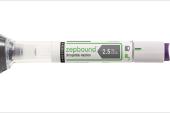Stopping Tirzepatide Leads to Rebound in Weight, Cardiometabolic Risk
Patients with overweight or obesity who continued with treatment, however, saw additional benefits in SURMOUNT-4.

After an open-label, lead-in phase during which patients dropped an average of one-fifth of their body weight, continuing with tirzepatide for another 52 weeks resulted in an additional loss of 5.5%. On the flip side, patients randomized to placebo at that point (withdrawal of tirzepatide) gained back 14.0% over the subsequent year.
Weight loss with tirzepatide—an incretin-based agent that activates two hormones that influence appetite, food intake, and metabolic function: glucagon-like peptide-1 (GLP-1) and glucose-dependent insulinotropic polypeptide (GIP)—was associated with significant improvements in various cardiometabolic risk factors, including blood pressure, lipid levels, and glycemic measures. The rebound in body weight after withdrawal of the drug negated some of those gains.
“The SURMOUNT-4 trial results emphasize the need to continue pharmacotherapy to prevent weight regain and ensure the maintenance of weight reduction and its associated cardiometabolic benefits,” researchers led by Louis Aronne, MD (Weill Cornell Medicine, New York, NY), say in a paper published online Monday in JAMA.
Multiple trials of various classes of weight-loss medications, including semaglutide (Wegovy; Novo Nordisk), a GLP-1 receptor agonist, have also shown a rebound in body weight when therapy is stopped, they note.
“The consistency of these data across therapeutic classes spanning more than two decades suggests that obesity is a chronic metabolic condition similar to type 2 diabetes and hypertension requiring long-term therapy in most patients,” Aronne et al write.
They should become knowledgeable about their basic mechanisms of action and modes of delivery and become comfortable with prescribing injectables, Sattar added. “Over the next 10, 15 years, more cardiologists will be needed to prescribe such drugs to their patients to give holistic care, not just for preventing cardiovascular events but also for reducing the risk of developing other comorbidities that are increasingly common in their patients.”
The SURMOUNT-4 Trial
Tirzepatide was approved initially by the US Food and Drug Administration in May 2022 as a treatment for type 2 diabetes, under the trade name Mounjaro, and last month it received an indication for chronic weight management, under the trade name Zepbound. The latter decision was supported by the results of the SURMOUNT-1 and SURMOUNT-2 trials. Subsequently, the SURMOUNT-3 trial demonstrated that tirzepatide further reduced weight in patients who had already achieved at least a 5% reduction with an intensive lifestyle intervention.
In SURMOUNT-4, conducted at 70 sites in Argentina, Brazil, Taiwan, and the US, the investigators evaluated the impact of continuing or withdrawing treatment in patients with overweight or obesity who completed an initial 36-week, open-label period of once-daily subcutaneous tirzepatide at the maximum tolerated dose (either 10 or 15 mg). Of 783 patients who entered the lead-in phase, 670 (mean age 48 years; 71% women) were randomized at 36 weeks to continue treatment or switch to placebo, in addition to receiving counseling on diet and exercise.
Among the patients who were ultimately randomized, the most common comorbidities at the start of the lead-in phase were hypertension (35.2%) and dyslipidemia (31.6%). Mean starting body mass index (BMI) was 38.4 kg/m2.
During the lead-in phase, patients lost an average of 20.9% of their body weight, reaching a mean BMI of 30.5 kg/m2 at the time of randomization. There were accompanying improvements in waist circumference, blood pressure, glycemic parameters, lipid levels, and patient-reported assessments of health status and quality of life.
During the 1-year randomized phase of the trial, patients who continued on tirzepatide continued to lose weight, while those on placebo gained back some of the previously lost weight. By the end of the study (88 weeks after the beginning of the lead-in phase), patients who continued on tirzepatide were much more likely to maintain at least 80% of the weight lost during the lead-in period (89.5% vs 16.6%; P < 0.001).
Even though patients who discontinued treatment regained some of their lost weight, they were still ahead at the end of the study compared with enrollment, having lost an average of 9.9% of their body weight. That figure was 25.3% for those who were on tirzepatide the entire time.
The improvements in cardiometabolic risk factors observed in the lead-in phase grew larger among patients who continued on tirzepatide in the randomized phase, with placebo-treated patients giving back some of the previously earned gains.
Consistent with previous studies of incretin-based therapies, GI side effects like nausea, diarrhea, constipation, and vomiting were common, although the investigators report that they were mostly mild to moderate in severity.
‘Cardiologists Have to Pay Attention to Weight Loss’
Commenting for TCTMD, Michael Blaha, MD (Johns Hopkins Medicine, Baltimore, MD), said the SURMOUNT-4 results are important for practicing clinicians who are using GLP-1 receptor agonists for weight loss, providing information on what happens if the drugs are stopped and if they are used for longer than a year. And for cardiologists in particular, there are data on how this agent positively impacts cardiometabolic risk factors. All of these issues come up daily in conversations with patients, he added.
Even before the randomized phase, there were substantial reductions in various risk factors, Blaha noted, pointing to the decrease in systolic BP from a mean of 126 mm Hg to 115 mm Hg and the drop in triglycerides from a mean of 136.2 mg/dL to 99.1 mg/dL. Those reductions are the equivalent of the impact from using one antihypertensive or one statin, respectively, he pointed out. “I think that’s very important.”
The trial was not designed to assess the effect of tirzepatide on cardiovascular outcomes, and currently there is only definitive evidence of CV risk reduction with these types of agents from the SELECT trial of semaglutide.
“SELECT tells us that cardiologists have to pay attention to weight loss, because there’s just such tremendous benefit on cardiovascular events” and kidney outcomes, Blaha said. The GI side effects should not be discounted and need to be considered along with cost when considering using a drug like tirzepatide, he added, “but in those who can get access to the drug and take it, there’s substantial benefits.”
The number of patients living with CVD who also have obesity and other comorbidities is increasing, Sattar noted. “So if you have agents that are able to both be safe from a cardiovascular perspective, and perhaps even reduce further events, and also lower weight substantially, that has the ability to lower the risk of multiple other complications that patients with cardiovascular disease are now suffering from, such as diabetes, chronic kidney disease, possibly heart failure, osteoarthritis, and fatty liver disease.”
He noted that a definitive answer on whether tirzepatide will reduce CV events like semaglutide did in SELECT will come from ongoing large trials like SURPASS-CVOT and SURMOUNT-MMO. For now, Sattar said the best evidence regarding the impact of tirzepatide on CV events comes from a meta-analysis he led.
“That meta-analysis, I think, reassured most readers that it looks like tirzepatide is at least safe with respect to cardiovascular events, with a hint of possible protection, but we don’t actually know that definitively until we have a large outcome trial,” he said.
Todd Neale is the Associate News Editor for TCTMD and a Senior Medical Journalist. He got his start in journalism at …
Read Full BioSources
Aronne LJ, Sattar N, Horn DB, et al. Continued treatment with tirzepatide for maintenance of weight reduction in adults with obesity: the SURMOUNT-4 randomized clinical trial. JAMA. 2023;Epub ahead of print.
Disclosures
- The study was sponsored by Eli Lilly.
- Aronne reports receiving grants or personal fees from Altimmune, AstraZeneca, Boehringer Ingelheim, Eli Lilly, ERX, Gelesis, Intellihealth, Jamieson Wellness, Janssen, Novo Nordisk, Optum, Pfizer, Senda Biosciences, and Versanis and being a shareholder of Allurion, ERX Pharmaceuticals, Gelesis, Intellihealth, and Jamieson Wellness.
- Sattar reports receiving personal fees or grants from Abbott Laboratories, Amgen, AstraZeneca, Boehringer, Eli Lilly, Hanmi Pharmaceuticals, Janssen, Merck Sharp & Dohme, Novartis, Novo Nordisk, Pfizer, Roche, and Sanofi outside the submitted work.
- Blaha reports serving on advisory boards for Novo Nordisk and Boehringer Ingelheim and providing independent CME supported by Eli Lilly.





Comments